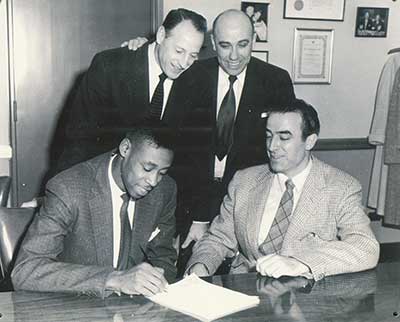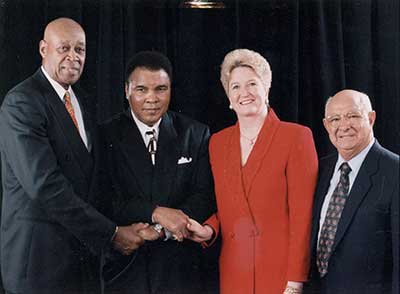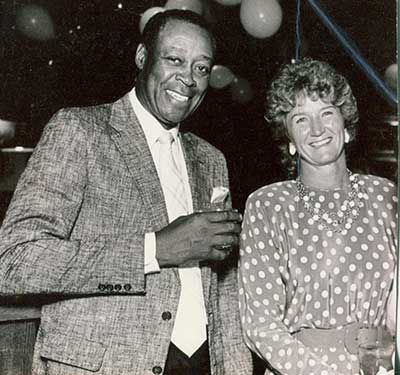
Double Your Impact for the Holidays
Double Your Impact for the Holidays
Your urgently needed year-end gift can go twice as far to provide care and support and accelerate Alzheimer's research this holiday season — and all year long. Show your giving spirit today during this 2x Match Challenge.
Donate NowCaregiver Wife Jan Tucker and Former NBA Player Jim Tucker Share Their Story
In 1955, Jim Tucker and his former teammate Earl Lloyd were the first two African Americans to play on an NBA championship team. Until just last year, Jim boasted the fastest triple double in a game, a record he held for over six decades. His story is featured in the documentary “Let 'Em Know You're There: The Story of Big Jim & The Triple Double,” which highlights his basketball successes and speaks to his battle with Alzheimer’s disease. We spoke to Jim and his wife Jan about the past, the present and what lies ahead as they face Jim’s Alzheimer’s together.
 Jan, tell us about Jim’s diagnosis.
Jan, tell us about Jim’s diagnosis.
Jan: Long before Jim was diagnosed, I noticed that he would often lose his glasses, wallet or car keys. Then about 15 years ago, we went to St. Andrews in Scotland to play golf. We were on two different flights and had planned to meet at JFK Airport. When we met, I realized that he didn’t have any of his slacks packed. He is still a very tall 6’7 today, and back then, he was 6’10. How many places in Scotland do you think have Big and Tall men’s clothes? Luckily we found a shop called High and Mighty in Edinburgh where we swiftly purchased six pairs of pants! He didn’t seem fazed that he forgot his slacks; that was unlike him.
At first, I thought his forgetfulness may be part of the normal aging process. A couple of times, I said: “It could be more complicated.” He would say: “Nah, there is nothing wrong with me.” A decade later, when he was 79 years old, Jim was diagnosed with Alzheimer’s disease. Today he is 86.
What was it like telling your family about Jim’s diagnosis?
Jan: Jim is a very pragmatic person who doesn’t like surprises, so it was a very matter-of-fact conversation with the people we shared it with.
Jim: I just wasn’t ready to die. I wanted to focus on the future.
Jan: We asked ourselves what we needed to do to move forward.
Jan, tell us about the digital memory book you created for Jim.
Jan: I went through hundreds of photos and pieces of memorabilia — newspaper clippings, a telegram from 1952 from a scout with the Harlem Globetrotters, Jim’s documents from when he signed on to play professional basketball — all of it. I put over 400 photographs together and every one is a photo of Jim or of him with someone from his life … his kids, his family, his friends. A lot of the pictures I have are of his grandchildren and my nephew’s kids. He loves babies! There are several photos of him holding babies.
Jim: It makes me feel fantastic. The photos help me recall all the good times in my life.
I know that Earl (Lloyd) and I did something special that hadn’t been done: Black players winning an NBA championship. Sometimes I remember that moment, and sometimes I don’t. If this is the way I have to live it, it’s the way I have to live it.
What is your life like today?
Jan: I had retired, but then I was offered another position working out of my home, which meant that Jim and I could always be at home together. The living room is steps from my office. On good days, Jim will still walk the dog; all the neighbors know him and our dog!
During the day, Jim will watch television and scan the newspaper. He doesn't read anymore, even though he will sometimes look through a book. He used to read two books a week. Now he will pick up an old favorite and not recognize it.
We live in a tight-knit community. We spend Monday nights with friends; Jim hangs out at the golf course with the guys. We have a church dinner every Wednesday night and Friday nights are spent at the golf club, spending time with other couples.
Jim: We definitely have lots of lunches and dinners with our friends.
Jan: Jim responds very well to being engaged with people. When we go out with friends, he is in an improved mood. That said, some days are good ones. Others are not. It’s a roll of the dice. Sometimes he is very lucid and responsive to questions, and other times he isn’t.
 Jim, you’ve said that you want to leave a memory with every person you meet. How do you want to be remembered?
Jim, you’ve said that you want to leave a memory with every person you meet. How do you want to be remembered?
Jim: That I was 6’7, 232 lbs. An athlete. A husband, a father and a friend. A good person to spend time around.
Jan: He is a very modest man. He would never toot his own horn. If you ask anybody they would say he’s the kindest, gentlest guy you'd ever hope to meet. I’ve told some of our friends sometimes he sometimes gets agitated because of the disease, and they are shocked. It is so out of character for him. It’s the disease. It’s not Jim.
What advice do you have for other families faced with Alzheimer’s and dementia?
Jan: I encourage people to share what they’ve learned, but also recognize that if you know one person with Alzheimer’s, you know ONE person with Alzheimer’s. Every person is different and you often have to find your own way through this disease.
I found support groups and meetings to join. I talked with elder care attorneys to help navigate the health and financial strains of this disease. I did a lot of homework.
What is scariest is the unknown. Jim doesn’t remember the past, or today, and we have no clue what's happening tomorrow. The more support you can find will help you get through the trying times. People must take advantage of the available resources from the Alzheimer’s Association. I use the Helpline number (800.272.3900) when I am at my wit’s end. The people on the other end of the line mean so much to people in our situation.
 We need to find a cure. We have to keep the conversation going. It’s a horrible diagnosis for the person with the disease, and their family. In your lifetime, you would never expect this to happen to you. Sometimes I get really mad at Jim and I don’t mean to. Sadly, the silver living is that he doesn’t remember I got mad at him
We need to find a cure. We have to keep the conversation going. It’s a horrible diagnosis for the person with the disease, and their family. In your lifetime, you would never expect this to happen to you. Sometimes I get really mad at Jim and I don’t mean to. Sadly, the silver living is that he doesn’t remember I got mad at him
We hear Jim has a standing joke about your marriage…
Jan: I am 70. Jim is 86. We’ve been together for 35 years. When people ask how long he has been married, he’ll roll his eyes...
Jim: … And I say “All my life.” I have to joke and have good feelings most of the time. Gotta be positive.
~Jan’s Advice About Caregiving~
Jim has six children living across the country who are in contact with their dad regularly. Jan sends updates on a regular basis, often by email. Some of her advice is included below.
Use Alzheimer’s Resources
Even if you have read a lot about Alzheimer’s, there are a lot of alz.org resources that caregivers use and that families will find to be helpful in navigating and understanding the disease, from care training resources to the 24/7 free Helpline (800.272.3900.)
Some Days Are Better Than Others
Every day won’t be the same; life with a person living with Alzheimer’s isn’t always predictable. Jan found that online support groups were helpful in her day-to-day life as a caregiver. She tries to be as positive as possible when talking to Jim, diverting the conversation to happy thoughts that make their time together the most enjoyable.
Take Care of You
When someone receives an Alzheimer’s diagnosis, that doesn’t mean all journeys are the same, but they will all be tough. Being there for the person with the disease and taking care of yourself are just two things you can do. You need to be at your best in order to care for someone you love.
Helping Others
If you’re interested in ways that you can help a family grappling with Alzheimer’s, read 10 Ways to Help A Family.
Watch more about Jim's story in “Let 'Em Know You're There: The Story of Big Jim & The Triple Double.”
Photo 1: Jim signing his NBA contract in 1953; Photo 2: NBA 1955 World Championship Ring awarded to Jim and four of his teammates 60 years after they won the Championship; Photo 3: Jim and Jan with Muhammed Ali and friend and trainer Angelo Dundee; Photo 4: Jim and Jan 35 years ago
